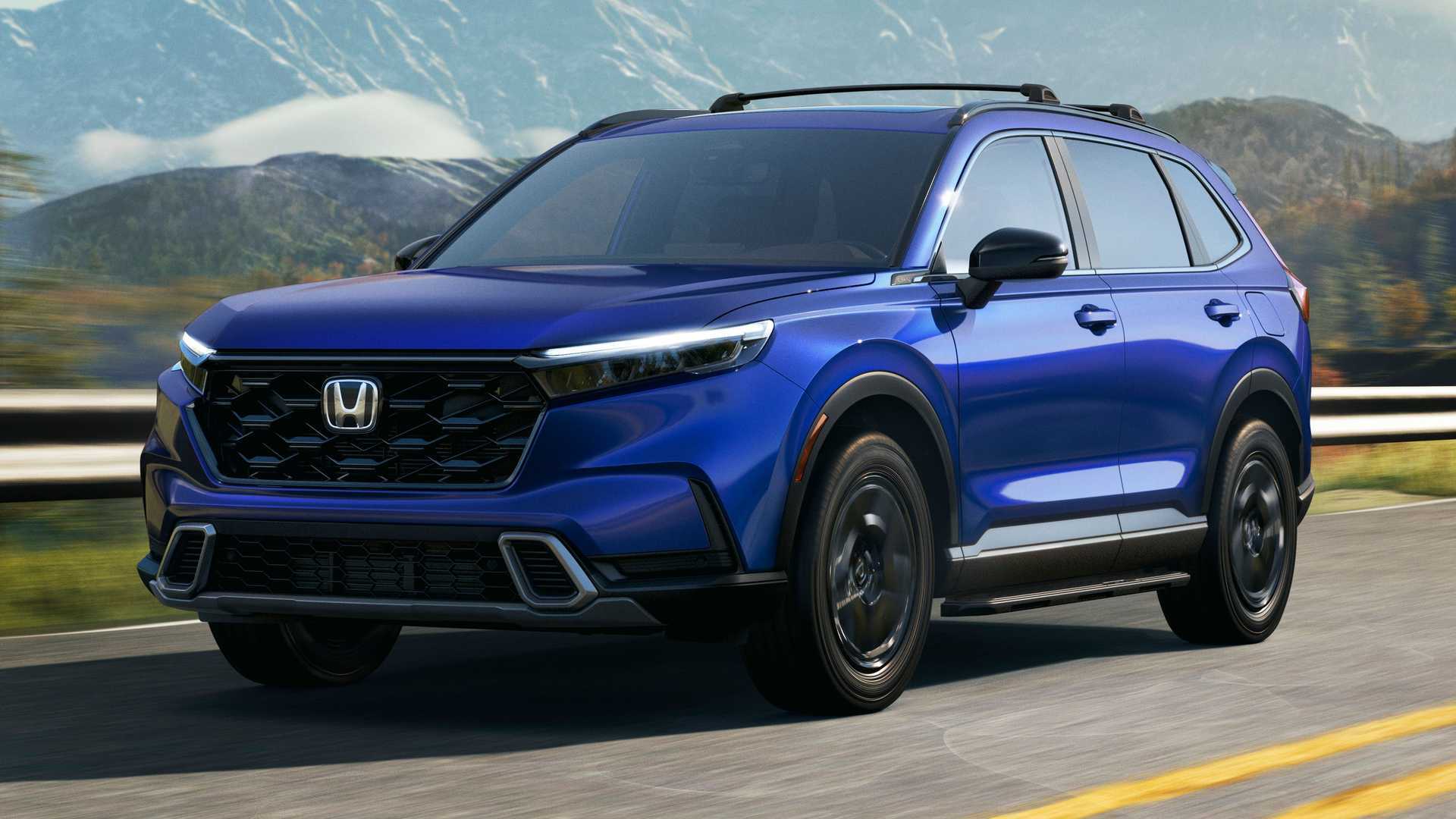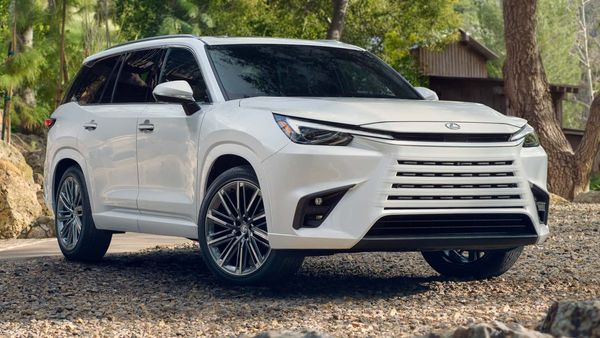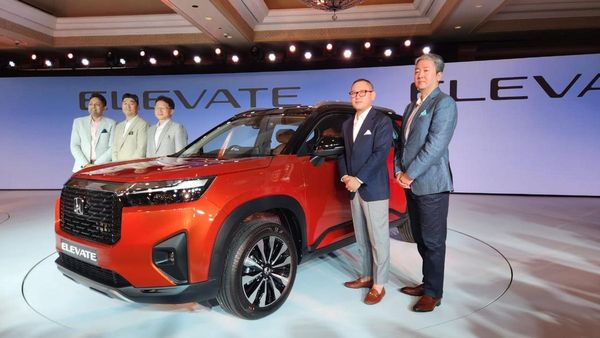
Design | Comfort | Tech | Performance | Safety | Fuel Economy | Pricing | FAQ
–Berkley, Michigan
Honda, like so many automakers, is making lots of noise about its focus on electrification. And that's good. The industry needs to decarbonize and even if full electrification is most desirable, more drivers in efficient hybrids is the next best thing.
Unfortunately, the noise the latest Honda CR-V Hybrid makes is a bit too literal. Where the latest hybridized Accord is economical and smooth, while also serving as a satisfying replacement for a dearly departed 2.0T engine, the CR-V is merely good on fuel. And while that might be enough for some drivers, during my week at the helm the overwhelming noise and thrashy helm had me wishing for Honda's lovable turbocharged 1.5-liter – which is still available on the crossover, but only in LX, EX, and EX-L form
A vehicle's ratings are relative only to its own segment and not the new-vehicle market as a whole. For more on how Motor1.com rates cars, click here.
Gallery: 2023 Honda CR-V Hybrid







- Exterior Color: Canyon River Blue
- Interior Color: Black
- Wheel Size: 19 Inches
I've said plenty about Honda's current focus on conservative design, which feels like a gross overreaction to the chilly reception for the last Civic's style. No other vehicle in the lineup typifies the problem with that approach than the characterless CR-V. Narrow headlights flank a hexagonal grille – aside from the boxed H in the center, the fascia could belong to a vehicle from any number of automakers. At the back, the new CR-V makes only small changes to last generation’s attractive, mostly vertical taillights. But in between the two ends, there's little to distinguish this Honda's two-box shape or styling from any of its competitors.
The CR-V's cabin is derivative, borrowing heavily from the Civic, but the execution is superior to the exterior. The honeycomb strip running from door to door on the dash is no longer novel, but it still looks very nice, and material quality throughout is near the top of the class (only the aged Mazda CX-5 is better). All the switchgear is top-of-the-line for a compact CUV, with satisfying actions on the climate control knobs and assorted buttons/switches. However, like the Accord, there's a mind-numbing lack of color. The seats are either black (featured here) or gray, while every other surface is as dark as a moonless night.
- Seating Capacity: 5
- Seating Configuration: 2 / 3
- Cargo Capacity: 36.3 / 76.5 Cubic Feet
Honda knows how to make a comfortable, supportive driver's seat that's adjustable to just the right distance from the steering wheel and pedals, and the latest CR-V is no exception. This is arguably my favorite driver's throne in the segment. Life in back is nearly as good, with a cushy bench – with the driver's seat set for my long-legged, 6-foot-2 body, I still had room for my knees. There's plenty of cargo space too, although I'll never understand automakers that don't add a lip at the hatch to keep things from rolling out.
As with the gas-only CR-V, this Honda has a composed and predictable ride, even if it doesn't quite iron out every tiny imperfection. There's little road, tire, or wind noise, too. But the big, ugly fly in the ointment is under hood, where the Hybrid's 2.0-liter, Atkinson-cycle engine is loud, coarse, and unpleasant pretty much every time it fires up. As far as I can tell, this is the exact same engine in the Accord Hybrid, which I just did 700 miles in with nary a complaint. I can't understand why it's so much louder and less refined in the CR-V, but in this case the 2.0-liter is nearly bad enough to warrant avoiding this gas-electric crossover altogether.
- Center Display: 9.0-inch Touchscreen
- Instrument Cluster Display: 7.0 Inches
- Wireless Apple CarPlay or Android Auto: Yes
My CR-V Sport Touring tester comes standard with a 9.0-inch touchscreen that responds promptly to inputs but doesn't make the visual statement of the bigger displays in rivals like the Mazda CX-50 (up to 10.3 inches), Ford Escape (up to 13.2 inches), or the Motor1.com Star Award-winning Kia Sportage Hybrid (up to 12.3 inches). The frustrating thing is that Honda has larger, more impressive display in the Accord that'd be more competitive here and is available with advanced features like Google connectivity.
- Engine: 2.0-liter I4
- Output: 204 Horsepower / 247 Pound-Feet
- Transmission: Dual-Motor Integrated Power Unit
I won't dip into the complexities of why the new CR-V Hybrid's powertrain is better than the old – Brett T. Evans' first drive from October 2022 does a good job of that – but suffice to say that power and torque are up in the 2023 model. That doesn't mean the CR-V is a two-box race car (although that does exist now), especially compared to rivals that offer zippier powertrain options. Still, the CR-V has ample low-end shove that makes suburban driving a cinch. Highway driving, though, requires a bit too much pedal for passing maneuvers, even relative to the turbocharged 1.5-liter CR-V. And too often, those conditions provoke the gas engine into action, which lends far more noise than action.
The CR-V possesses average handling for the class, with composed body motions along with general lack of enthusiasm. And while it possesses regenerative braking abilities separate of the actual brake pedal, the mechanical stoppers work well enough too. There's a touch too much pedal travel, but modulation is easy and the bite point is predictable.
- Driver Assistance Level: SAE Level 2 (Hands-On)
- NHTSA Rating: Not Rated
- IIHS Rating: Top Safety Pick Plus
Honda Sensing. That's the story. Standard on every version of the CR-V (and the Civic, Accord, Ridgeline, Pilot… you get the picture), the overall suite functions beautifully. On the highway, the adaptive cruise control, lane-centering system, and traffic-sign recognition are faultless. And at lower speeds, traffic jam assistance reduces the strain of stop-and-go driving.
My tester, the range-topping Sport Touring, adds blind-spot monitoring, low-speed braking control, and front and rear parking sensors. None are so necessary that they're worth upgrading to the top-of-the-line model, and the inclusion of all other safety gear on lesser trims makes that argument stronger still.
- City: 40 MPG
- Highway: 34 MPG
- Combined: 37 MPG
- Base Price: $28,410 + $1,295 Destination
- Trim Base Price: $40,395
- As-Tested Price: $40,395
Where the gas-powered CR-V is available in three trims (base LX, volume EX, and plusher EX-L), the CR-V Hybrid is only available in Sport or Sport Touring. The former is broadly analogous to the EX, while the latter builds on the EX-L, but their prices only partially reflect that similarity. While the base hybrid costs $33,695 (including a $1,295 destination charge), or $1,340 more than the EX, my $40,395 Sport Touring adds nearly $4,000 to the EX-L's price tag. You can take a look at Honda’s configurator, but as with all Honda products, configuring a CR-V is a simple matter – pick a trim, pick exterior and interior colors, and you’re done.
While I believe that the CR-V broadly outclasses the Toyota RAV4 in terms of interior quality, equipment, and technology, the price of my top-end tester is alarmingly close to the starting price of the powerful, more efficient RAV4 Prime ($43,675). And that's before considering any state or local tax credits for a PHEV (the Prime is no longer eligible for federal tax credits). The RAV4 is far more powerful, outdoes the CR-V Hybrid by one mile per gallon combined, and comes with the option of covering 42 miles on electric power alone.
Meanwhile, the Kia Sportage Hybrid exists – it beat the gas-powered CR-V (and a host of rivals) to win a Motor1.com Star Award last year, and with the range-topping SX Prestige model demanding just $37,715, it's a hugely compelling option that costs $2,680 less than the CR-V Sport Touring and returns better fuel economy (38s across the board with all-wheel drive). Considering its high price then, I'm struggling to see the case for the top-of-the-line CR-V Hybrid.
CR-V Hybrid Competitor Reviews:
- Ford Escape Hybrid: Not Rated
- Hyundai Tucson Hybrid: Not Rated
- Kia Sportage Hybrid: Not Rated
- Toyota RAV4 Hybrid: Not Rated
- Toyota RAV4 Prime: 9.0 / 10
FAQs:
How Much Does The 2023 Honda CR-V Hybrid Cost?
Prices for the 2023 Honda CR-V start at $29,705, including a $1,295 destination charge. The base hybrid-powered Sport, though, comes in at $33,695, or about $1,300 more than an equivalent CR-V EX. The top-end CR-V Sport Touring demands $40,395, though, or nearly $4,000 more than the equivalent gas-only trim.
Does The 2023 Honda CR-V Hybrid Need To Be Plugged In?
No. The 2023 Honda CR-V Hybrid might not be a traditional hybrid, but neither is it a plug-in hybrid. Instead, it mostly uses the gas engine as an onboard generator for recharging the battery. A pair of electric motors provide motivation in all but the rarest of cases.
Is The 2023 Honda CR-V Hybrid Better Than The 2023 Toyota RAV4 Hybrid?
The 2023 Honda CR-V is newer and carries fresher equipment. The cabin's material quality is better, too. However, the RAV4 Hybrid is more efficient and comes in a far wider variety of trims. Ultimately, which is "better" will depend on the owner's specific use case.










